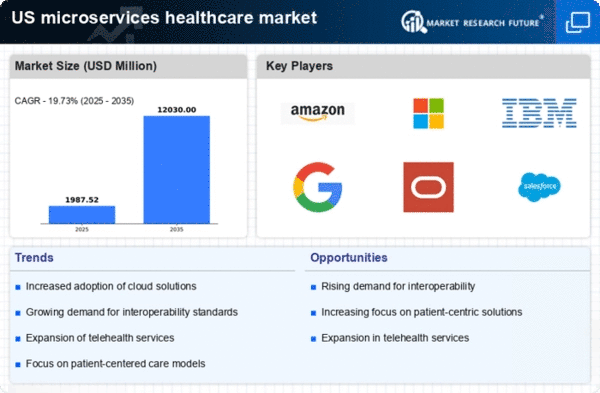Rising Demand for Scalability
The microservices healthcare market is experiencing a notable increase in demand for scalable solutions. As healthcare organizations strive to enhance their operational efficiency, the ability to scale applications seamlessly becomes crucial. This demand is driven by the need to accommodate fluctuating patient volumes and the integration of new technologies. According to recent data, approximately 70% of healthcare providers in the US are seeking scalable solutions to manage their growing data needs. This trend indicates a shift towards microservices architecture, which allows for modular development and deployment, thereby facilitating rapid adjustments to changing healthcare requirements. The microservices healthcare market is likely to benefit from this growing emphasis on scalability, as organizations recognize the potential for improved service delivery and patient outcomes.
Shift Towards Value-Based Care
The microservices healthcare market is witnessing a shift towards value-based care, which emphasizes patient outcomes over service volume. This transition is prompting healthcare organizations to adopt microservices architectures that support data sharing and collaboration among providers. By leveraging microservices, organizations can create integrated care pathways that enhance patient engagement and satisfaction. Recent data indicates that approximately 65% of healthcare providers in the US are transitioning to value-based care models, which necessitate the use of technology that can adapt to changing care delivery requirements. This shift is likely to drive the microservices healthcare market, as organizations seek solutions that align with value-based care principles and improve overall healthcare quality.
Enhanced Data Security Requirements
In the microservices healthcare market, the increasing focus on data security is a significant driver. With the rise in cyber threats and data breaches, healthcare organizations are prioritizing the protection of sensitive patient information. Regulatory frameworks, such as HIPAA, mandate stringent security measures, compelling organizations to adopt microservices architectures that enhance data security. By utilizing microservices, healthcare providers can implement robust security protocols at each service level, thereby minimizing vulnerabilities. Recent statistics suggest that nearly 60% of healthcare organizations in the US have reported investing in advanced security measures to safeguard their data. This heightened emphasis on security is likely to propel the microservices healthcare market, as organizations seek solutions that not only comply with regulations but also protect against evolving cyber threats.
Growing Focus on Telehealth Solutions
the microservices healthcare market is increasingly driven by a focus on telehealth solutions.. As healthcare providers seek to expand access to care, telehealth has emerged as a viable option for delivering services remotely. Microservices architecture supports the development of flexible and scalable telehealth applications, enabling healthcare organizations to respond to patient needs effectively. Recent surveys indicate that nearly 75% of healthcare providers in the US are investing in telehealth technologies to enhance service delivery. This trend suggests a significant opportunity for the microservices healthcare market, as organizations recognize the importance of integrating telehealth into their service offerings to improve patient access and satisfaction.
Integration of Artificial Intelligence
The integration of artificial intelligence (AI) into the microservices healthcare market is emerging as a pivotal driver. AI technologies are being increasingly adopted to enhance clinical decision-making, streamline operations, and improve patient care. The microservices architecture facilitates the deployment of AI applications, allowing healthcare organizations to leverage data analytics and machine learning effectively. Recent studies indicate that around 50% of healthcare providers in the US are exploring AI solutions to optimize their services. This trend suggests a growing recognition of the potential benefits of AI in healthcare, including reduced operational costs and improved patient outcomes. As AI continues to evolve, its integration within the microservices healthcare market is expected to accelerate, driving innovation and efficiency across the sector.
















